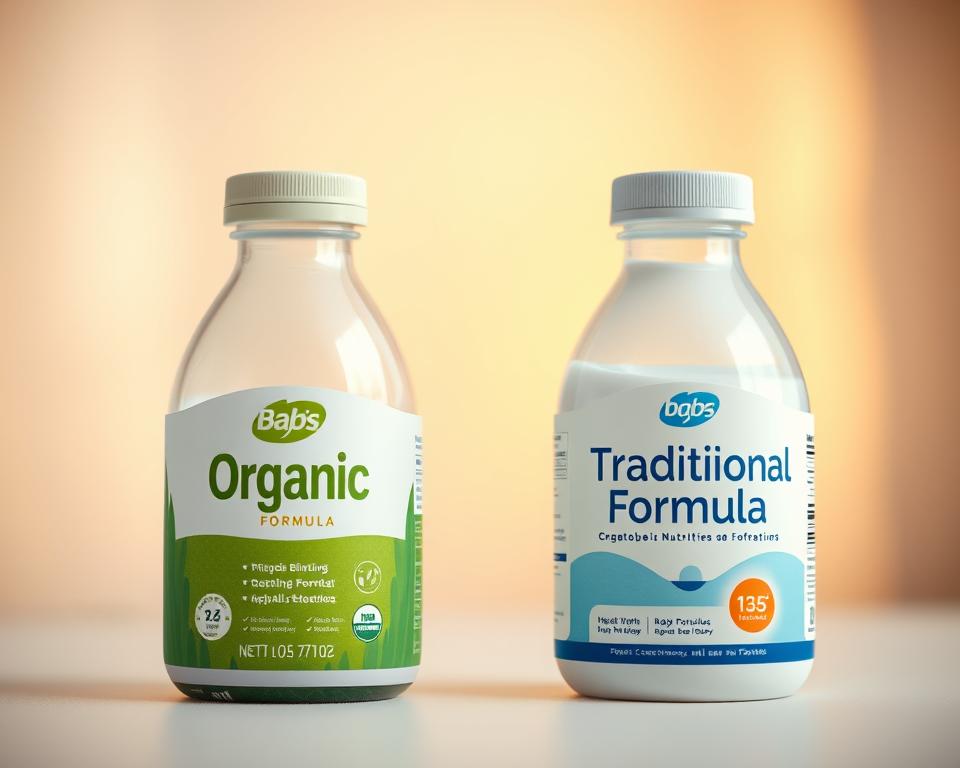Locate the Finest Organic Baby Formulas: Parental Handbook
Roughly 80% of U.S. parents turn to formula within baby’s first twelve months. Breastfeeding hurdles often lead to this choice. Picking the ideal organic newborn Baby formula matters greatly to these parents. Our handbook helps caregivers choose the optimum organic formula for their little ones.
Let’s explore different formulas by brand, highlighting quality and health. These insights are critical for a wholesome infant beginning.
Choosing the right food for your baby is a critical decision for every parent. Formulas made from certified organic ingredients have surged in demand. It delivers a purer nutrition source. Organic products avoid synthetic pesticides and fertilizers, giving your little one a cleaner start.
Moms and dads value formulas free from GMOs and synthetic extras. This awareness highlights the growing preference for organic formulas as a safe choice for infant health.
Perks of Using Organic Elements
Choosing organic constituents yields key benefits. They undergo strict testing for superior quality and protected safety. Picking organic varieties lets caregivers know their baby avoids toxic residues.
Organic farming methods champion eco-friendly and sustainable practices. Thus, organic choices support both your baby’s health and the planet.
Associated Health Advantages
The health advantages of organic formula reflect a positive impact on infant development. Research shows organic-fed infants tend toward fewer tummy troubles and allergy risks. The absence of chemicals underpins these positive effects.
Caregivers appreciate the peace of mind from these well-rounded formulas. Such formulas aid healthy growth and general well-being.

Essential Criteria for Choosing Organic Formula
Choosing the best organic baby formula is a critical decision for a baby’s health. Examine both protein origins and vital micronutrients. How proteins are sourced and balanced impacts digestion and nourishment. Awareness of critical vitamins and fats secures optimal development and health.
Protein Origin and Proportion
Most baby formulas use whey and casein as protein sources. Whey is easier to digest, while casein provides a slow release of nutrients. The whey-to-casein ratio is key, with a higher whey ratio being better for a baby’s sensitive stomach. Many organic options boost whey content for digestive comfort. Choose products that specify their protein blend and proper proportions.
Key Micronutrients and Enhancements
Core vitamins and minerals matter for infant growth. Docosahexaenoic acid and arachidonic acid support neural and visual development. Prebiotics also play a role in digestive health and immune system strength. Look out for these components to secure complete nourishment. These organics provide robust nutrient profiles.
| Protein Source | Benefits | Whey-to-Casein Ratio |
|---|---|---|
| Whey | Easier digestibility|Gentle on tummies|Quick absorption | Higher ratio is better|Lean whey blend preferred|Above 60% ideal |
| Casein | Slow release of nutrients|Sustained nourishment|Stomach-friendly over time | Lower ratio preferred in early months|Casein kept minimal|Around 40% or less |
Popular Organic Baby Formula Brands
Moms and dads rely on established brands when buying organics. Below are notable labels and what makes them special. Leaders in USDA-certified organics, they meet distinct caregiver expectations.
Kendamil: The Whole Milk Option
Kendamil’s formula uses pure whole milk for distinct creaminess. This formula boasts a rich, creamy texture and avoids controversial additives. Caregivers favor it for its simple, clean ingredients. Buying Kendamil online is straightforward and convenient.
HiPP’s Combiotik for Delicate Digestions
HiPP Combiotik is crafted to be gentle on sensitive stomachs. It includes prebiotics and probiotics for better digestion. Parents often choose HiPP for its commitment to organic, high-quality ingredients, making it a favorite in organic baby food shops.
Holle Bio’s Premium European Blend
Holle Bio is renowned for its biodynamic farming practices, providing premium certified organic formula. Renowned for exacting standards and green principles. Parents trust Holle for its authentic taste and nutrition.
Aussie Bubs: The Grass-Fed Option
By sourcing from grass-fed herds, Aussie Bubs maximizes nutrient density. Ingredients mirror a holistic, pasture-based ethos. This distinct sourcing helps caregivers identify premium organics.
Bobbie’s Forward-Looking Formula
Leading-edge and organic, Bobbie sets new standards. Fulfills today’s nutritional guidelines alongside organic purity. Moms and dads trust Bobbie for its evidence-based, organic formula.
Choosing the right organic formula for your baby requires careful thought about their dietary needs. Accounting for sensitivities ensures a comfortable feeding experience. Formula makeup plays a huge role in easing infant digestion.
Evaluating Food Sensitivities
Some babies show intolerance to specific proteins or sugars. Opt for specialized organic blends that address these issues. Sensitive blends reduce lactose or include pre-broken down proteins. These features aim to reduce irritation and aid in digestive health.
Seek medical advice to confirm the best feeding option.
Focusing on Tummy Comfort
Digestive comfort is essential for infants, and the right organic formula is key. Inclusions of pre- and probiotics support a balanced gut flora. By fostering beneficial bacteria, they enhance absorption and gut health.
Organic blends designed for breastfed infants deliver key components.
Guidelines for Formula Transition
Moving to organics from breast milk or conventional formula works best with steady changes. Knowing the right approach helps both caregiver and infant adjust. Gradual changes are key to a smooth transition and help your baby accept the organic formula.
Phased Introduction
Begin with small amounts of organics mixed in. Use this plan for the gentlest switch:
- Kick off by blending one part organic with three parts regular formula.
- Slowly tilt the balance until you reach 100% organic.
- Monitor your baby’s reactions closely. If your baby shows signs of discomfort, slow down the process.
- Serve the new formula during calm periods so baby links it with comfort.
- Stick to a feeding routine, as consistency can make the transition smoother.
Signs of Good Acceptance
As you navigate this transition, recognizing signs of good acceptance will provide reassurance:
- Baby nurses or bottles quietly and contentedly.
- Stool patterns stay even, and digestion remains smooth.
- Eating habits remain largely unchanged.
- Your baby appears happy and content after feedings.
Patience pays off—look for these signs for a favorable outcome.
Organic Baby Formula vs. Traditional Formula
Many parents are torn between organic baby formula and traditional formula when it comes to their infant’s nutrition. Your choice shapes your infant’s nourishment quality. Priority on safe elements and developmental advantages leads the selection.
Ingredient Comparisons
What goes into each formula type highlights their distinction. They feature only certified organic elements, omitting artificial chemicals. Labels such as HiPP and Kendamil source from eco-friendly dairies. Regular formulas can pack artificial additives and GMO-derived compounds. This highlights the organic formulas’ focus on natural, wholesome nutrition.
Price Considerations
Organic formulas generally carry premium pricing because of certification expenses. Organic formulas are generally pricier than traditional ones due to the costs of organic certification. Caregivers often deem the extra expense justified by wellness gains. Assessing cost versus benefit guides a balanced purchasing decision.
E-commerce platforms now simplify organic formula shopping. Now, they can purchase top-notch formulas from home. This change broadens access to a wider variety of brands and formulas, meeting diverse dietary requirements.
Buying Formula Online Perks
Online shopping brings numerous benefits for parents with hectic schedules. Easy ordering from any location.
- Convenience
- Variety: Explore an extensive selection of organic baby formulas across different brands
- E-tailer discounts often undercut store prices
Formula Subscription Benefits
Subscription models now dominate formula provisioning. They make buying formula easier by setting up regular deliveries of your preferred formulas.
Key features of infant formula subscriptions include:
- Never worry about restocking
- Adjust timing to fit your usage patterns
- Subscription rates often beat retail prices
Regulations Governing Organic Infant Nutrition
Ensuring the safety and quality of organic baby formulas is a complex task. This is governed by multiple compliance layers. FDA mandates safeguard formula nutrient profiles and hygiene. The USDA organic certification, on the other hand, verifies the authenticity of organic claims. Understanding these standards empowers parents to make informed choices for their infants.
FDA Oversight and Standards
The FDA is instrumental in regulating the infant formula market in the U.S. Their strict guidelines cover nutrient requirements and permissible ingredients. This ensures that each formula meets the nutritional needs of a growing baby. Main elements are:
- Mandatory ingredient listings|Required ingredient disclosures|Compulsory component labeling
- Specific nutrient requirements such as protein, fats, and vitamins|Defined macro- and micronutrient thresholds|Preset nutrition minimums
- Comprehensive quality control measures during manufacturing|Rigorous production inspections|Stringent safety checks
Compliance ensures safe, well-balanced formula offerings.
USDA Organic Requirements
USDA organics seals mark trusted formula authenticity. USDA checks confirm full adherence to organic protocols. Key criteria include:
- Proof that ingredients are produced without synthetic fertilizers or pesticides|No chemical fertilizers or sprays used|Farm inputs must be 100% natural
- Verification of non-GMO (genetically modified organism) status|Guarantee of GMO-free sourcing|Strict non-GMO testing
- Clear guidelines on the handling and processing of organic products|Protected organic integrity during production|Certified organic processing rules
Organic formulas with USDA certification assure that ingredients come from organic farms. This promotes healthier options for infants. Dual oversight ensures both safety and organic integrity.
| Regulatory Aspect | Description |
|---|---|
| FDA Regulations | Sets safety and nutrient standards for infant formula |
| USDA Organic Certification | Ensures organic ingredients are grown without harmful substances |
| Quality Control | Mandatory checks during production processes |
| Ingredient Transparency | Clear labeling of all components for consumer knowledge |
Buying Guide for Organic Formulas
Choosing the right organic baby formula can seem daunting. But with key tips, parents can confidently select the best option. Being aware of sources and certifications eases the purchase.
Where to Buy Organic Baby Formula Online
Many trusted online stores offer a broad range of organic baby formulas. You’ll find periodic discounts online. Here are some top choices:
- Amazon – Known for its wide variety and fast shipping
- Target – Provides flexible shipping and pickup services
- Walmart – Blends e-commerce with neighborhood store stock
- Thrive Market – Curates wellness-oriented selections
Check user feedback and ratings first. Use reviews to judge formula performance and vendor service.
Understanding Labeling and Certifications
Understanding labels and certifications is vital when buying organic baby formula. Check for recognized organic marks. Typical certifications are:
| Certification | Description |
|---|---|
| USDA Organic | Indicates the formula contains at least 95% organic ingredients |
| Non-GMO Project Verified | Means the formula does not use genetically modified organisms |
| European Union Organic | Denotes adherence to EU organic farming regulations |
Recognizing seals guarantees purity and health.
In Closing
In summary, the right organic choice shapes infant wellness significantly. Certified organic formulas guarantee comprehensive infant care. Your baby receives balanced nourishment free from chemicals. Moms and dads learned to evaluate proteins, allergies, and trusted labels such as HiPP and Holle.
Our guide underscored customizing choices to your baby’s health. Switching to organics requires a thoughtful approach. It should ensure a gradual shift that prioritizes your child’s comfort and health.
Guided by these pointers, you’ll choose with confidence from many choices. Opting for organic feeding fosters lifelong nutritional good habits. Remain committed to offering the best start in life. We should support them with the best possible choices as they begin their food journey.


